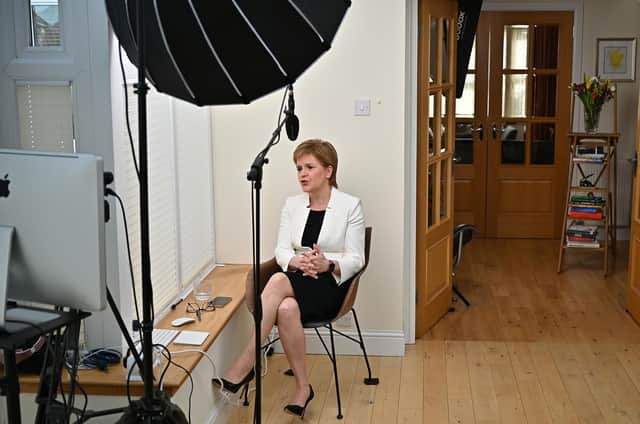Nicola Sturgeon and SNP are being given a far too easy ride by Scotland's broadcasters – Brian Wilson


By any objective standard, it was an important story. The government had acted unlawfully, which is a sufficiently unusual finding against any government to be of significance in itself.
The subject of the Scotsman’s Freedom of Information request remains of intense relevance, given the need for public trust in the basis for taking these decisions. Indeed, this was the reason given by the Information Commissioner for his ruling.
Advertisement
Hide AdAdvertisement
Hide AdPut these two factors together and you have, surely, a story that should also have been leading every news bulletin in Scottish broadcasting. Instead, as far as I can trace, there was total silence. The “unlawful” action of the Scottish government was ignored by our national broadcasters.
This is no isolated example. I recently drew attention to the response of the Convention of Scotland Local Authorities (Cosla) to the Scottish government budget having been sidelined. All 32 council leaders in Scotland, including SNP ones, signed a letter of outrage to the First Minister about the latest assault on their ability to deliver services – perhaps a unique happening.
If the parallel had occurred under Mrs Thatcher in the 1980s, I suggested, it would have led every Scottish TV news bulletin for days. A major furore. Now, in the age of devolution and SNP dominance, it was not worthy of a mention, far less a running story, demanding responses from ministers.
Drawing attention to such examples can easily turn into a random list of criticisms, brushed aside by BBC Scotland and STV with the old chestnut: we’re attacked by both sides, therefore we must be in the middle. So let’s pre-empt that one. This is not a claim of deliberate bias but a questioning of attitude, training and standards.
As every first-year student of journalism should know, 90 per cent of bias (as it emerges) comes from news selection, rather than doctoring the script. If a story goes unreported, the nature of content does not arise. The relevant question is about how news is defined and I have quoted two examples of stories which might well have led any Scottish news bulletin, but were discarded.
There is no channel for challenging these judgements but neither is there an obligation to respect them, particularly when a pattern exists and one has the advantage of remembering better times.
The issue can be addressed by each of the political reporters we see on our screens answering honestly the question: “When did you last originate or pursue a story which remotely inconvenienced the Scottish government?”
Most of what passes for political reporting by Scotland’s broadcasters is actually regurgitation of what is handed down by those in authority. Journalism is something quite different. It is about finding things out and particularly things that those in authority do not want you to find out. How often is that challenge met or even attempted?
Advertisement
Hide AdAdvertisement
Hide AdYou need to be of a certain age to remember Kenny MacIntyre when he was BBC Scotland’s fearless political reporter. There really should be a Kenny MacIntyre Memorial Award but maybe not, for who would be eligible to enter? Kenny’s only bias was in favour of finding stories which inconvenienced politicians – regardless of status or party, day after day.
He would have held in contempt the present-day school of reporting – let’s stand outside Holyrood reading the latest communique, and would you be so kind as to give us a prepared sound-bite, minister.
Kenny’s firm view was that if a politician couldn’t stand up to a hard, door-stepping interview then he or she shouldn’t be in the job, and he would chase them down corridors to say so.
Scotland’s broadcasters need to change their mindset and play their part in holding authority to account. The problem is not that its political coverage is consciously biased, just lazy and acquiescent to the powers that be, because nothing more is demanded of it.
A message from the Editor:
Thank you for reading this article. We're more reliant on your support than ever as the shift in consumer habits brought about by coronavirus impacts our advertisers.
If you haven't already, please consider supporting our trusted, fact-checked journalism by taking out a digital subscription.
Comments
Want to join the conversation? Please or to comment on this article.

